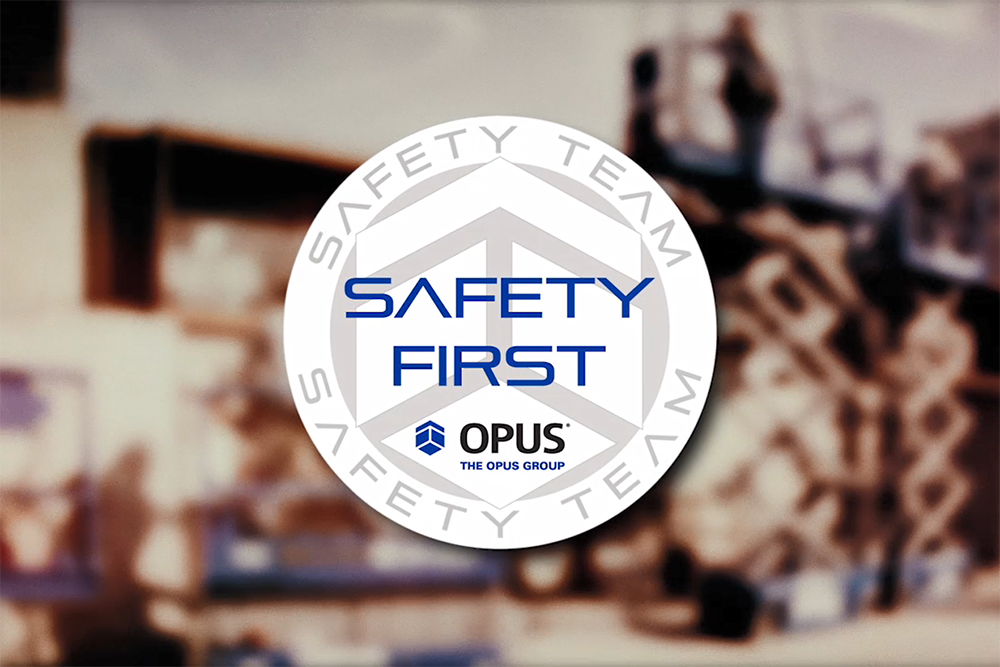Safety First Culture Valued at Opus
“Safety First” isn’t just a catchphrase for us; it’s built into our culture and a key component of its everyday operations.

“Safety First” isn’t just a catchphrase at Minnetonka-based The Opus Group, it’s built into the company’s culture and a key component of its everyday operations.
“As an organization, we make safety part of our culture,” says Matt Rauenhorst, vice president of real estate development at Opus Development Company, L.L.C. From the company leadership to all of the people in the different departments, “we put an emphasis on the importance of all of our associates going home to their families safe, uninjured every night after work. We’ve always made safety part of our culture because we value our associates who are out there doing the hard work on the construction sites of these buildings.”
The company recognizes that safety cannot be in the background. “Safety has to be in the foreground of all things we do at all of the different levels of the organization,” he says.
How does Opus promote safety as part of its culture?
Safety starts at the top
“Our leaders are involved in safety committees, safety meetings and safety stand-downs and they even observe and participate in periodic safety walk-throughs,” says Jeff Walker, director of operations at Opus Design Build, L.L.C. “And what I mean by leaders – that’s not only our superintendents and foremen on our job sites – that’s our project managers all the way up to the presidents of our company. Dave Bangasser, Tim Murnane and Dave Menke go out to our job sites periodically and attend the monthly safety meetings. Tim, for example, has been out to job sites at 6:30 a.m. safety meetings with all the folks on-site and shared what safety means to him."
“We really believe strongly that our safety culture starts at the top with our leaders and from there extends to the folks that are actually the boots-on-the-ground doing the work on the job site,” Walker adds.
Make safety an everyday topic
Project update meetings routinely include an item on the agenda that addresses safety, Rauenhorst says.
By way of example, “it might not just be there were no injuries last week; it might be something we learned on-site that we found that will help make other sites safer,” Rauenhorst says. As another example, “even outside of work, we can say, ‘Here’s a safety item I found this week that I wanted to share.’”
Make sure everyone wears appropriate safety equipment
All of Opus' construction crews wear appropriate safety equipment. In addition, “when we go out on-site, we also make sure all of our non-construction folks – all of our office folks – are wearing the right safety equipment,” Rauenhorst says. “And it’s also about making sure they’re having conversations with the people on-site about safety and showing that it matters – not just for our construction teams but for everyone.”
Commitment to training
Opus is committed to providing consistent safety training to ensure that each job site superintendent receives OSHA certified training.
“Also, if there’s a situation on a project that requires a unique fall protection system or has a unique condition where there’s a potential safety concern, we will do specific training to accommodate that unique circumstance to try to ensure that our associates are knowledgeable about safe working practices,” Walker says.
Recognizing associates in the field that are driving the success
At project close-out meetings, Opus recognizes and celebrates successful safety records on each construction project.
Seeking new and improved technologies to keep job sites safer
Opus continually strives for new construction practices that can help keep workers and the general public safer. For example, the company recently implemented tool tethering technology to make working from heights safer for those doing the work and those on the ground.
Tool tethering technologies protect workers and the general public from the potential dangers of unsecured tools without hindering productivity. They’re designed to secure a wide range of tools, including hammers, pry bars, hard hats and knives.
“We have employed a number of the newest safety products out there and tool tethering is one of them,” Walker says. “Another program we’ve embraced and been out in front of is silica management.”
Silica is in the dust created from grinding or sawing concrete and has been proven to be cancer-causing, not unlike asbestos, Walker explains.
“OSHA has released a silica standard but hasn’t begun enforcing it yet,” he says. “We’ve been proactive over the last couple of years in purchasing and implementing new tools that collect the dust from concrete grinding and saw-cutting operations. We are proud of our steps to be ahead of the curve on silica management technology.”
Celebrating safety awards
Opus’ safety program recently received the LECET Safety Driven Award of Excellence. LECET is the Minnesota Laborers-Employers Cooperation and Education Trust. To be considered for the award, contractors must have achieved a minimum number of safety points per program rules, such as improving documentation, making safety equipment or procedural improvements, hosting dedicated safety meetings or sharing best practices. Opus was one of 36 Minnesota contractors to receive the award.
Opus also was recently awarded MNSHARP certifications at two high-profile projects – Oxbō Luxury Apartments in St. Paul and the 365 Nicollet Luxury Apartments in Minneapolis. The Minnesota Safety and Health Achievement Recognition Program (MNSHARP) certifications are for outstanding job site safety and health practices. Both of Opus’ projects met the stringent requirements for the certification program. A prior Opus entity received the first-ever MNSHARP certification in the early 2000s for the Medtronic Cardiac Rhythm Disease Management campus in Mounds View.
“Now our team members have five total projects that have been recognized as MNSHARP work sites,” Walker says. “We’re really proud of those rewards, because we think it really does recognize the leadership involvement of our program.”
This article originally appeared in the Minnesota Commercial Association of Realtors e-newsletter.At Opus, the safety of our associates and the general public is a priority on all of our projects. Promoting a safe work environment is an important part of our corporate culture. Learn more.
Article Type: Blog Post
Topics: Minneapolis | Safety


